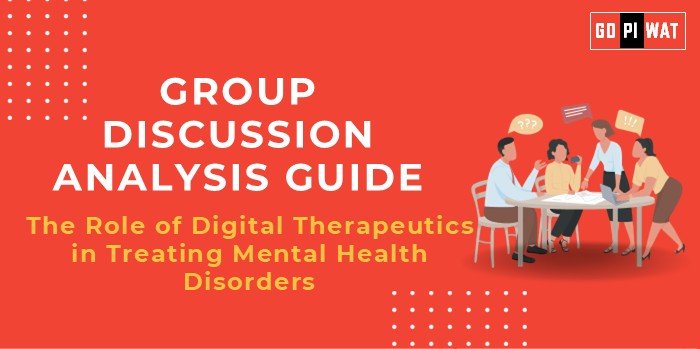📋 Group Discussion (GD) Analysis Guide
💡 The Role of Digital Therapeutics in Treating Mental Health Disorders
🌐 Introduction to the Topic
Opening Context: “The integration of technology into healthcare is revolutionizing mental health treatment, with digital therapeutics emerging as a pivotal innovation to address global mental health challenges.”
Topic Background: Digital therapeutics utilize software-based interventions to prevent, manage, or treat mental health conditions. With mental health disorders affecting nearly one in five people globally, scalable solutions like these are crucial. Recent advancements, including FDA-approved apps for conditions like depression and anxiety, highlight their growing importance.
📊 Quick Facts and Key Statistics
- Mental Health Impact: 970 million people worldwide live with mental disorders (WHO, 2023).
- Digital Health Market: Expected to reach $25 billion by 2025, with mental health apps being a major contributor.
- Accessibility Advantage: 60% of patients with mental disorders in low-income countries lack access to care; digital therapeutics bridge this gap.
- Cost Efficiency: Studies show app-based therapies reduce costs by 30%-40% compared to traditional therapy.
- Engagement Rates: Digital tools increase patient adherence to mental health treatments by 20%-25%.
🤝 Stakeholders and Their Roles
- Governments: Regulating and funding digital therapeutic programs, ensuring equitable access.
- Tech Companies: Developing innovative, evidence-based mental health apps.
- Healthcare Providers: Integrating digital therapeutics with traditional care models.
- Patients: Benefiting from accessible, affordable, and stigma-free mental health care.
- Global Organizations (e.g., WHO): Promoting the adoption of digital solutions in underserved regions.
🏆 Achievements and Challenges
- Achievements:
- Increased Access: Teletherapy platforms like Talkspace have enabled millions to receive care remotely.
- Evidence-Based Success: FDA-approved digital therapies like Pear Therapeutics’ reSET are effective for mental health treatment.
- Reduction in Stigma: Anonymity in digital solutions encourages more people to seek help.
- Challenges:
- Privacy Concerns: Data breaches and inadequate privacy protections deter adoption.
- Digital Divide: Limited access in rural and underserved communities.
- Clinical Validation: Need for robust clinical trials to prove efficacy.
🌍 Global Comparisons
- USA: Leading in FDA-approved digital therapeutic apps.
- Nordic Countries: Successfully integrating these solutions into public health systems.
Case Study: Headspace demonstrated a 25% reduction in stress levels among its users. Wysa in India provided AI-driven mental health support to over 4 million users.
💬 Structured Arguments for Discussion
- Supporting Stance: “Digital therapeutics democratize mental healthcare, offering scalable and effective solutions for underserved populations.”
- Opposing Stance: “Dependence on technology creates new risks, including data security issues and limited efficacy in severe cases.”
- Balanced Perspective: “While digital therapeutics offer transformative potential, their effectiveness depends on integration with traditional care models and robust privacy safeguards.”
✅ Effective Discussion Approaches
- Opening Approaches:
- Quote-based: “As WHO emphasizes, mental health is an integral part of public health, and digital tools can transform its accessibility.”
- Problem-Driven: “With nearly 60% of global mental health patients lacking care, digital therapeutics provide a vital alternative.”
- Counter-Argument Handling: Reference proven case studies, such as FDA approvals or global adoption rates.
📊 Strategic Analysis of Strengths and Weaknesses
- Strengths: Cost-effective, scalable, stigma-free access.
- Weaknesses: Privacy concerns, efficacy validation gaps.
- Opportunities: Integration with AI and telemedicine, government partnerships.
- Threats: Regulatory barriers, digital literacy gaps.
📚 Connecting with B-School Applications
- Real-World Applications: Digital therapeutics align with healthcare management, tech-driven innovation, and policy analysis.
- Sample Interview Questions:
- “How can digital therapeutics transform healthcare delivery in emerging economies?”
- “Evaluate the role of privacy laws in shaping the adoption of mental health apps.”
- Insights for B-School Students: Opportunities for interdisciplinary projects combining healthcare, technology, and data analytics.


